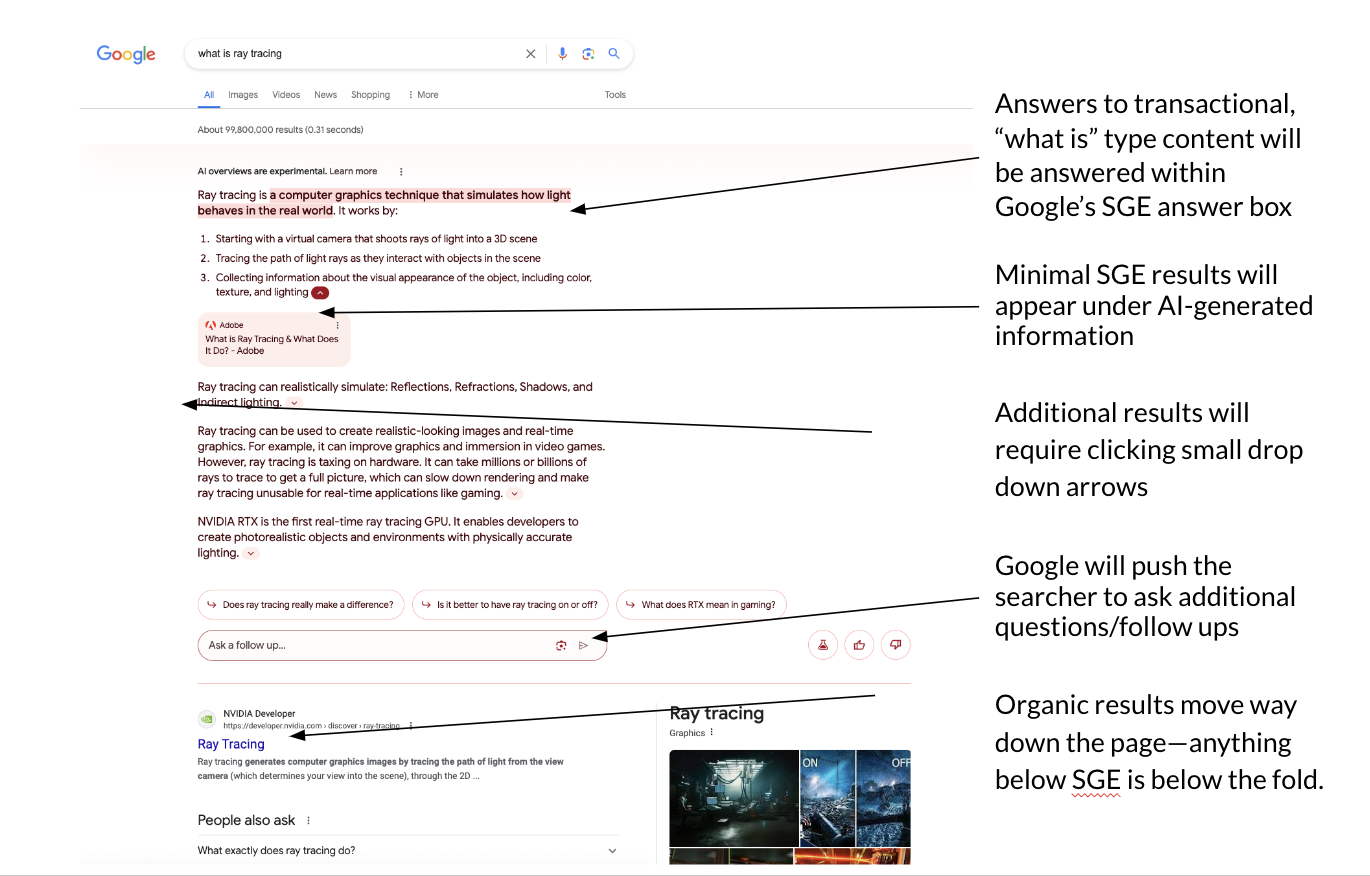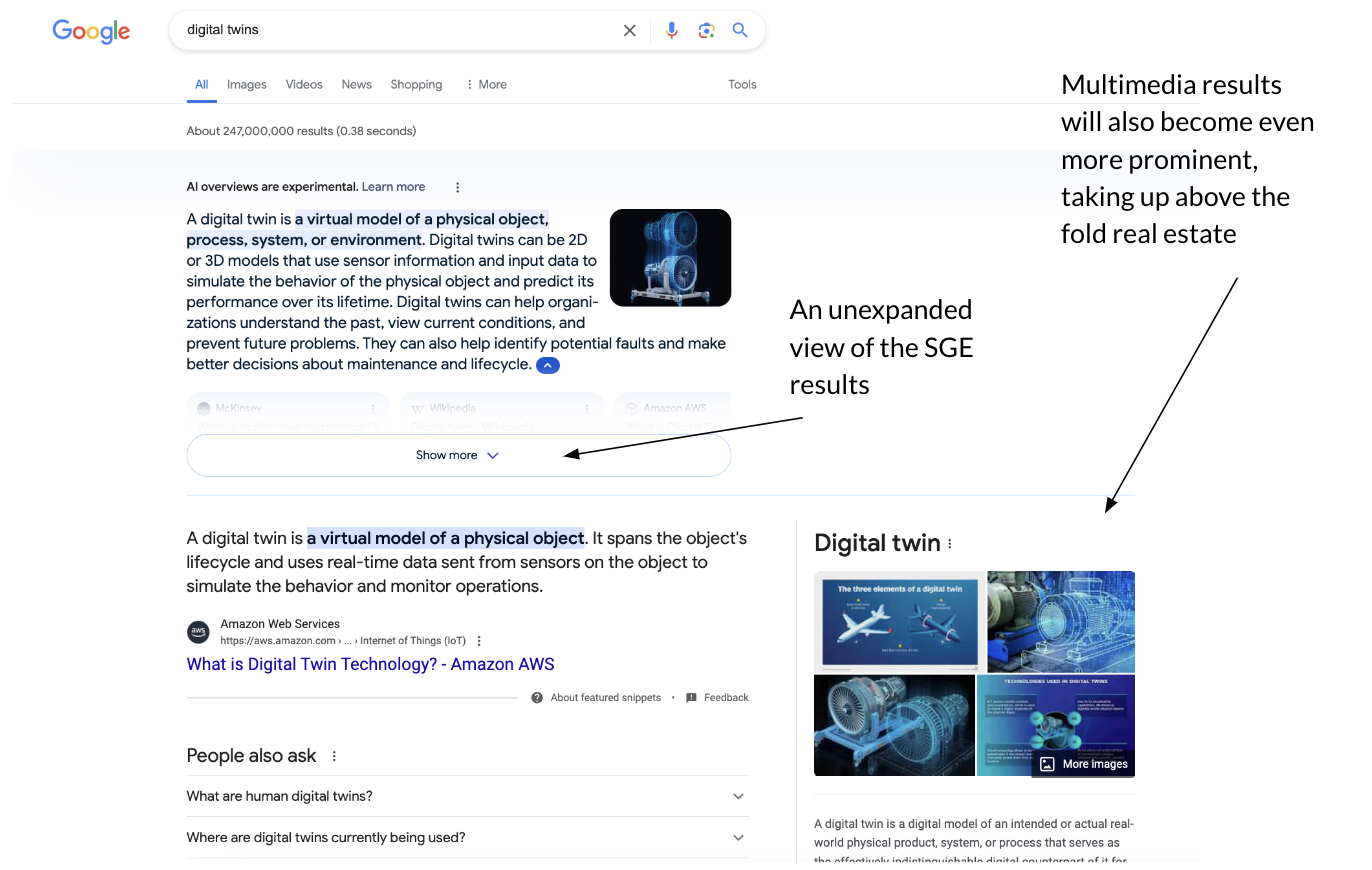How Will AI Change SEO?
SEO has undergone dozens of iterations over the past few decades—from the reign of keyword stuffing to “skyscraper” techniques, which encourage writing a longer and more thorough article than your competitors. With the ascent of artificial intelligence-powered large language models (LLMs) like ChatGPT and Google’s Gemini, which can answer questions quickly, you might wonder if SEO is about to undergo another seismic shift.
Will AI replace search engines—and, by extension, SEO?
Whether or not search engines are entirely replaced by LLMs, one thing is extremely clear: SEO strategies will have to shift. This is due to two key changes:
AI tools can quickly automate content generation, creating a content glut that can overwhelm searchers. This is already leading to huge changes in Google’s search engine result pages (SERPs).
LLMs are increasingly adept at understanding user intent and the nuance of different queries. This makes searchers more likely to turn to AI for simple queries—and means that content creators need to think beyond traditional keywords.
Here’s how AI is shaping the future of SEO, and why it’s important to understand your users and craft meaningful, human content.
How AI Has Changed SEO
In SEO’s Wild West—the ‘00s and early ‘10s—website owners stuffed their pages with keywords. If you were targeting the keyword “container gardening,” for example, you would use that exact keyword as many times as possible. The end result was overwhelming, and definitely not user-friendly.
Thankfully, these days are over. Now, SEO strategists and content creators focus on creating useful, helpful content designed for humans, not Google. However, this quest to write the most helpful content often meant creating incredibly long “ultimate guides” covering every tiny detail of a topic—the skyscraper technique. Not that helpful, if the searcher wants something specific!
Another classic SEO technique is called “hub and spoke.” With this method, you pick a topic you’re particularly knowledgeable about and break it down into smaller, more digestible topics. For instance, container gardening might be your hub, and one spoke might be “tomato container gardening.” You may even have more articles about fertilizing tomatoes grown in containers and which types of tomatoes are great for tomatoes. We still love this technique at Masthead—it’s a great way to come up with lots of high-quality content ideas. It also makes your expertise super-clear to Google.
But for AI-fueled content creators, it also creates a blueprint for swamping the internet with lots and lots of low-quality content. It’s super easy to quickly write hundreds of SEO articles, and this has led to a flood of shallow, low-quality content.
Have you noticed it getting harder and harder to find good information via search? This phenomenon is particularly prominent if you’re searching for tech support help or have a question about your favorite video game, but it’s affected every area of the web.
This content deluge makes it hard for websites to stand out and win traditional keywords—even if they’re creating excellent content! But there’s hope yet: In response, Google has started adjusting SERPs to highlight different types of content, from TikToks to personal essays. This creates a wealth of opportunities for SEO content if you’re willing to think differently.
The Importance of High-Quality Human Content
Google’s latest algorithm updates want to do two things:
Promote human insights that help the searcher understand more about a topic…
…While also providing simple answers directly on the SERPs.
The days of targeting high-volume keywords with evergreen “explainer” content are gone. Why would a searcher click through to your article when the information they seek is highlighted on the search engine result page?
In order to grab today’s searchers, content creators need to provide additional human insights that an LLM wouldn’t know. This requires paying close attention to your E-E-A-T—that means “experience, expertise, authority, and trust,” and it’s how Google determines what is high-quality content.
E-E-A-T emphasizes:
Credible authors with demonstrable expertise. Expertise can range from “they’ve published research on a topic” to “they have written extensively about this topic”—basically, you want to prove that you know what you’re talking about.
Established websites with a solid reputation. Here’s where those hub-and-spoke maps come into play. Publishing a number of in-depth, expert-informed articles on a single subject matter tells Google what your website is about.
Accurate, reliable, trustworthy content. You already have a leg up as a human, not an AI: LLMs tend to “hallucinate,” which is a friendly way to say “they make things up.” You know what you’re talking about!
Google’s primary goal is connecting searchers with the best possible information. Yes, that will likely mean answering some search questions directly using an LLM, like its search generative experience (SGE). This feature is still in beta, and its future status is unclear—but most SEOs feel confident that at some point, in some form, Google will integrate AI into the search interface.
Connecting searchers with the right information might also mean using “rich results,” or widgets that do things like highlight common questions or direct searchers to Google Maps. Google is already increasing the number of rich results shown on the SERP.
Google also will lead searchers toward human-created and -edited content that dives in-depth into the topic in a way an LLM cannot.
What Will Happen When AI Powers Search?
Welcome to the “zero-click future”—a world where many searchers don’t need (or want!) to click off Google to a separate website for information. Semantic search engines will be able to answer questions, provide information, and even dig deeper to provide in-depth responses to follow-up questions. Imagine ChatGPT, but built directly into Google’s search interface.
Here’s an example: Imagine you want to know the best plants for container gardening. In the future, you might be able to ask Google that question, and get a detailed answer that takes into account your location (and maybe even your favorite foods!). Why would you click onto any of the thousands of articles that purport to answer that question? You’ve already received your answer, and it’s tailored to you. Congratulations: You’ve performed a “zero-click search,” where you never leave Google’s results.
There’s no question that this future may create a dramatic, negative impact on organic traffic for many publishers, especially if they’re slow to adapt their SEO and content strategies. But this isn’t all doom and gloom—it’s an opportunity, especially if you’re a creative thinker.
Let’s go back to that “best plants for container gardening” example. Put yourself into the shoes of that hypothetical searcher: What would they click on? What might intrigue them enough to dig deeper than those AI-generated answers? They might want:
Reddit threads from users in their region talking about their container gardening experiences.
Blogs or articles from master gardeners talking not just about the plants that work best, but which specific varietals are best for your region… and why.
An article detailing “What I learned trying to grow container peas,” breaking down a season’s worth of gardening efforts and learnings in a digestible, narrative fashion.
A YouTube video from a real-life home gardener talking about their favorite tips and tricks.
Focusing on unique, high-quality content that highlights your expertise—and provides a human element AI can’t replicate—is the path forward for content creators in a post-AI world. Even the world’s most advanced LLM lacks that human touch.
How to Succeed in SEO in a Post-AI World
Winning SEO after the genesis of AI and LLMs requires creative thinking. (If you were a high school theater nerd, it’s your time to shine!) Put yourself in the shoes of searchers: What do they want? If they only want a simple answer, what might encourage them to click further? You can thrive in the zero-click search era by focusing on:
The Basics
Dive deeper into topics you know a lot about, offer original analyses, and use engaging formats like video, maps, and multimedia. Good content is still good content—and searchers will always be more likely to click on excellent content.
Additionally, brands must focus on user quality and experience. Is your site slow, or difficult to use? Is it unclear what action you want readers to take next—whether that be signing up for a newsletter or buying a product, or even just reading another article? Content strategy must focus on the broader picture, too, to ensure the basics are up to snuff.
Building Trust and Authority
Showcase your expertise, experience, and unique knowledge. What do you know that others don’t? How can you leverage your brand’s data to provide novel insights?
An expertise audit can help assess if the current way you’re demonstrating expertise is effective for both human readers and Google’s algorithm. At Masthead, we can help you develop a strategy to highlight what makes your brand stand out through expert-informed content that plays to your knowledge and strengths.
Targeting Long-tail Keywords
In many cases, the more detailed a searcher’s term, the more likely they are to want a human answer. For instance, a searcher typing in “container gardening” might just want an overview of the subject. Someone asking “container gardening best plants for denver co” may want human insight.
Those longer keywords are called “long-tail keywords.” While they’re searched less frequently, users also may be more likely to click and convert.
Fitting Your Content Strategy into Today’s SERPs
Developing a thorough content strategy that focuses on what makes your brand great is key to winning SEO in 2024. In addition to auditing your expertise, Masthead’s SEO and content strategists develop thorough hub-and-spoke maps designed to pair with your sales funnel. When accompanied by high-quality content, these maps showcase to Google exactly what you want to be known for—and what kind of searchers you want to attract.
But it’s not just about finding the right keyword and topics. It’s about making sure your page shows up on Google now. For instance, why would you waste your time targeting the top 10 positions for a high-volume keyword when that term targets zero-click searchers? Instead, pay attention to the rich results for your key terms, and develop a strategy that targets what searchers actually see and click on. This goes for new articles and for any refreshed or optimized content.
This might mean digging into your local SEO strategy, to ensure you appear in Google Maps, or prioritizing those long-tail keywords to target a “People Also Asked” box (which sometimes appears above position #1!).
A great content and SEO strategy is designed to help the right people find your content—not just shoot for position #1 without considering the context.
Here’s the bottom line: AI won't replace SEO anytime soon, but it’s a smart idea to start thinking in a new way about your content. By paying attention to E-E-A-T and the SERPs, you can target what searchers really want to find—and create a strong relationship with your audience.


